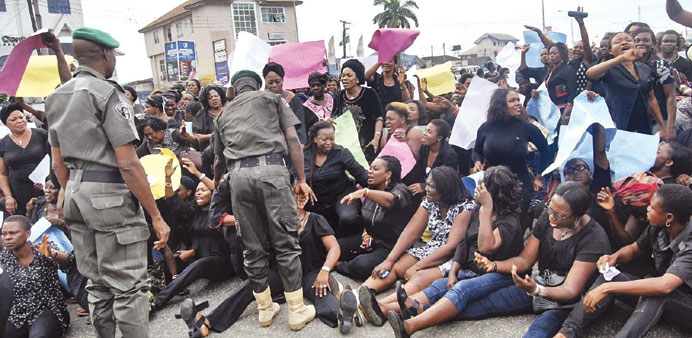Opposition All Progressives Congress party supporters sit on the ground during a march towards the Independent National Electoral Commission Office in Port Harcourt, calling for the cancellation of the presidential elections in the Rivers State. Some 2,000 women protesting against the conduct of elections in Nigeria’s Rivers state were teargassed yesterday as they tried to register their complaints with electoral officials.
Agencies/Abuja
Nigeria’s President Goodluck Jonathan and his ruling Peoples Democratic Party (PDP) were marginally ahead of his main challenger, as the first general election results came in yesterday.
Jonathan and the PDP polled 2,322,734 votes overall against 2,302,978 for former military ruler Muhammadu Buhari, of the All Progressives Congress (APC) - a difference of 19,756.
Buhari and the APC won five states while Jonathan secured three states plus the Federal Capital Territory of Abuja, with nine results in.
The winning presidential candidate needs not just the most votes but at least 25% support in two-thirds of Nigeria’s 36 states and the Federal Capital Territory to avoid a run-off.
The latter measure is designed to ensure a geographical spread of support across the country, with Nigeria divided along religious and ethnic lines.
International election observers gave broadly positive reactions to the conduct of the vote, despite late delivery of election materials and technical glitches with new voter authentication devices.
Nigeria’s Transition Monitoring Group, which had observers across the country, said: “These issues did not systematically disadvantage any candidate or party.”
The PDP and the APC on Sunday traded allegations of rigging and other irregularities, which raises the possibility of a legal challenge to the results. Violence has often flared in previous Nigerian votes after the winner is announced and the US and Britain warned of any rigging in the count.
“So far, we have seen no evidence of systemic manipulation of the process,” Secretary of State John Kerry and foreign minister Philip Hammond said in a joint statement.
“But there are disturbing indications that the collation process - where the votes are finally counted - may be subject to deliberate political interference,” they added.
Kayode Idowu, spokesman for the Independent National Electoral Commission (INEC) told AFP that there was “no basis” for the claim.
“There is no interference at all... We have no evidence of political interference,” he said.
Kaduna state, one of the areas worst-affected by violence four years ago when some 1,000 people were killed in post-election clashes, was said to be calm.
But there were mixed sentiments in the largest city in the north, Kano. “Election violence doesn’t pay anybody. I think Nigerians have learnt from the fallout of 2011 and they are ready to be peaceful... and behave responsibly,” said civil servant Salawu Abubakar.
But Suleyman Maaji, who also works for the government, added: “A lot of people decided to stay behind closed doors because they don’t know, they are afraid. They don’t know what might happen.”
Some 2,000 women protesting against the conduct of the elections were teargassed as they tried to converge on the local electoral commission offices in the southern oil city of Port Harcourt.
APC women’s leader Victoria Nyeche said yesterday after police used teargas: “What happened today was unprecedented... All we want is a fresh election because what happened on Saturday was a fraud.”
Political parties have been urged to take any disputes to court rather than the streets.
Jonathan’s PDP has been in power since Nigeria returned to civilian rule in 1999 but is being pushed to the wire by Buhari.
The prospect of a democratic transfer of power - plus economic woes caused by the slump in global oil prices, concerns about corruption and fears about insecurity - energised the vote.
The winning presidential candidate needs not just the most votes but at least 25% support in two-thirds of Nigeria’s 36 states and the Federal Capital Territory to avoid a run-off.
Voting was pushed into an unscheduled second day Sunday after failures in controversial new technology designed to read biometric identity cards to combat electoral fraud. Among those whose card did not work was the president himself.
Mohamed ibn Chambas, the UN envoy for West Africa, told the Security Council yesterday Boko Haram was unable to disrupt elections in Nigeria but its allegiance to Islamic State shows the group has an agenda that reaches well beyond Africa’s most populous country.
While Boko Haram fighters staged attacks on election day in Bauchi state, northeast Nigeria, “they didn’t have an impact on the voting process.”
“Boko Haram was unable to disrupt the electoral process,” he told the 15-member council.
Chambas said that Boko Haram’s announcement that it had pledged allegiance to the Islamic State, “whether for publicity reasons or to tap into ISIL support,” shows that “Boko Haram’s agenda goes beyond Nigeria.”

